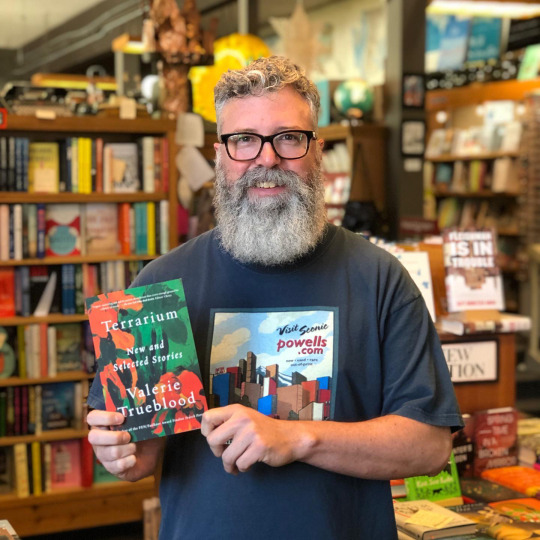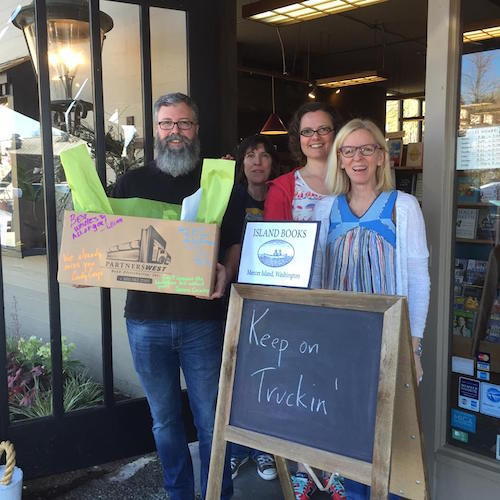#jamescrossley
Explore tagged Tumblr posts
Text
50 Years of Island Books: James Crossley

James Crossley has been a bookseller for over 20 years. His longest bookstore tenure was at Island Books, where he wrote so prolifically for their blog that Mercer Island was in danger of capsizing under the weight of his words. He was forced to flee to the mainland, and is now the manager of Madison Books in Seattle, named in 2022 by Publisher's Weekly as one of the five best bookstores in America.
Miriam: First off, my friend, I want to ask you about a way I know you left your individual imprint on the store. That was through buying, a skill which I’m sure comes in very handy today at Madison Books. Can you tell me about your philosophy behind buying and curating what goes on the shelves? In what way did the customers inform the books you chose to order and put on our display shelves?
James: I don't know if I'd call it a philosophy, although it's certainly closer to that than it is to a hard science. The only training I had before doing it involved hanging around in bookstores, but I have done A LOT of that in my life. I guess I think of selecting titles to carry as an attempt to answer a series of questions. Is this book like the others on our shelves? Is it by an author who's already popular? Is it nothing like the books on our shelves in a way that will provide surprise and delight? Is it important? Is it fun and frivolous? Can I imagine the audience for this book? Will we want a huge stack to satisfy hordes of readers? Do we want a single copy to wait quietly in a corner until one person finds it and thinks it was put there just for them? Will someone behind the counter here, maybe me, enjoy it and be excited about selling it? Add up all the yeses and the order is ready to place. Miraculously, the budget always adds up as neatly, almost like I planned it that way.
All of this is guided largely by the customers--paying attention to what they buy, and more importantly, what they love, is what makes it all possible. They teach us what to look for and then we find it for them. As I've said before, a bookstore is what happens when you put together some booksellers, some customers, and the ever-changing mixture of books that happens to be present on a given day. It's a dynamic, shared experience even more than it is a static, physical place.

Miriam: That’s for sure. What do you think the biggest misconceptions are about working in a bookstore? How does the location of the store inform a bookseller's experience?
James: "Oh, I wish I could work in a bookstore! I'd love to spend all my time reading!" If only. After twenty years of doing this, my total in-store page count doesn't add up to a chapter. But I do love working a job that inspires envy, regardless. The other big misconception is that bookstores are stodgy, old-fashioned operations. In fact, this is a game of continual reinvention, and those of us playing it try new things all the time. Hence the success of indie bookstores during the pandemic, relative to other kinds of retail.
Despite what I said earlier about a bookstore being more of a state of being than a physical place, location dictates a great deal about the experience. Who's coming in regularly? Hip young singles or families with lots of kids? Are they locals or outsiders? Compare the ostensibly similar stores on Mercer and Bainbridge Islands and consider how many more tourists one sees than the other. Nothing wrong with itinerant customers, but it's nice to see the same friendly faces on a consistent basis. And wherever a store is, I think it should always represent its community. You should be able to walk into it and find a comprehensive selection of books about its region and the people who live there. Easy enough in the Pacific Northwest, which is rich in history and with authors to write about it: Homewaters by David B. Williams, Pushed by Ana Maria Spagna, Unsettled Ground by Cassandra Tate, Where the Language Lives about Vi Hilbert, Tributes by Mary Henry…There's a reason that Mercer Island History was a top seller almost the whole time I worked at Island Books.

Miriam: I’m with you—don’t even use the word stodgy near the word bookstores. Creativity and drive characterize all the book people and indie bookstores I know! Speaking of creativity, tell me what it was like to watch Island Books move into the digital space. As I recall, you built the basic website, right? Do you have a favorite memory or mishap from that time? What did you feel shifted when we started the blog?
James: My first tech job in the store involved resuscitating a version of the Island Books website that had been set up by Nancy Shawn during her initial tenure. She'd left before I came on board but has since returned, of course. The island gets its hooks into everybody, doesn't it? It was a nice-looking site, but it didn't do much, as the technology for more wasn't available to us then. Soon after, though, I got the chance to switch us over to a more modern platform, one that accommodated easier updates and allowed customers to order books remotely. That web incarnation of Island Books included a prominent Shakespearean tagline first used in the store's early days: "I like this place and could willingly waste my time in it." Still one of my favorite ways to describe the joint.
My best memory, however, is that we somehow convinced management that the store needed a blog. If either of us had made the argument on our own it probably would have seemed silly, but together we marshalled a good case. That gave us the excuse to say almost whatever we wanted about books and spout those opinions frequently--twice a week at first! Not only did readers respond with enthusiasm, but they also told us they didn't want to have to look online for updates. Instead, they preferred we send them those posts via email, and so our newsletter was born. That kept us in touch with Mercer Island expatriates and gave us a wider audience besides. I'd always felt that Island Books was too well-kept a secret, and I think the blog put us on the national map next to other, more famous bookstores, where we'd always belonged.

Miriam: I agree, teamwork was the key. I have great memories of sitting in that back room with you and Roger, slowly coaxing our fearless leader at that time into the future. How do you think the blog changed the way Island Books connected to the community? Do you have a favorite post that comes to mind, maybe one that inspired a conversation or connected to an in-store memory?
James: Island Books has long been deeply, deeply ingrained in the Mercer Island community, since way before people started making fun of Al Gore for inventing the internet, so it's not as if the blog was some kind of breakthrough technology. It did connect us to a more far-flung audience, as I mentioned, and it did (and does) extend the presence of the store beyond its doors. When a customer is reading a post at home, hopefully they feel a bit as if they're in an armchair in the fiction section or having a chat across the counter.
Speaking of connections, my favorite posts include the ones where we found unexpected overlaps in our taste and got to banter about books we both liked, Chocolates for Breakfast and When Breath Becomes Air, for example. And I really love the posts that grew into or out of others, such as the one I wrote entirely in long, rambling sentences after you made a comment about my proclivity for long, rambling sentences. That's the way my mind always works when I read, with one book reminding me of another, sending me leapfrogging from one known lily pad to the next until I end up somewhere new.
My favorite in-store memory post is probably the one about the vulnerable little dollar bill that hung for dear life on a clothesline and warmed all our cold, cynical hearts. I also loved all the times we got to write about our kids. And the times you wrote about ballet, and those rare occasions we convinced Cindy to write something for us. Oh, and I have to mention the tribute to legendary Northwest writer Brian Doyle we ran in the last months of his life. For months, even years afterwards, it caused people from across the country to tell me how much he'd meant to them.
Miriam: Oh yes, Brian Doyle, of course. Also don't forget the time we interviewed Nancy Pearl together in the store, or that great interview you did with Joel McHale at his event! Wonderful memories, many of which are my favorites too. It's so good to catch up, James, as ever. Thanks for making the time.
To our Island Books community: In the next 50 Years of Island Books installment, I’ll be talking to former bookseller Kay Wilson, who worked at the store for over 15 years. She's living the good life on Lummi Island now, but get your to-read list ready. Kay's still brimming with book recommendations and she's going to share a list of her favorites, just for you.
—Miriam
4 notes
·
View notes